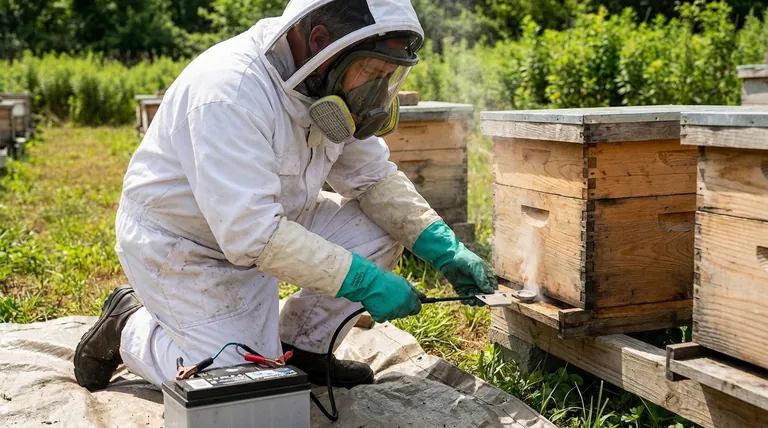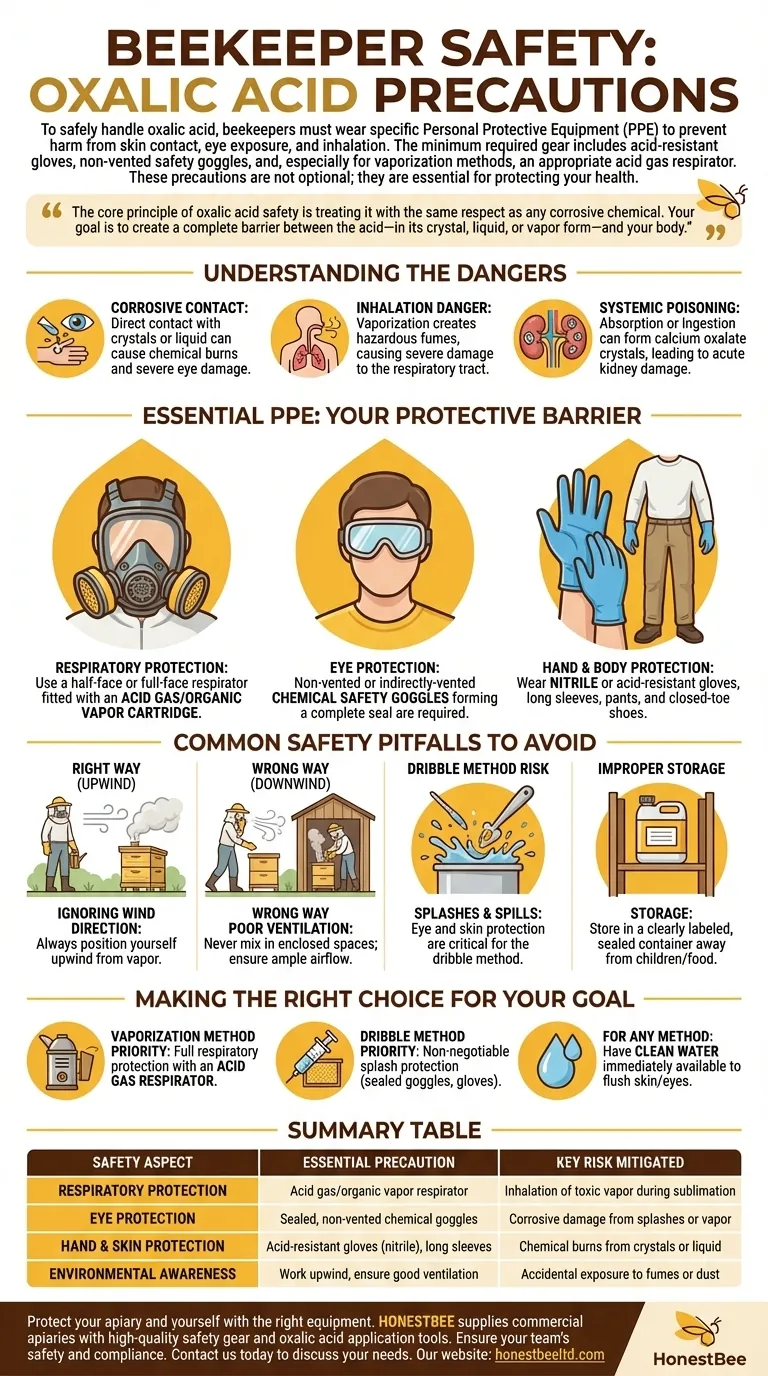To safely handle oxalic acid, beekeepers must wear specific Personal Protective Equipment (PPE) to prevent harm from skin contact, eye exposure, and inhalation. The minimum required gear includes acid-resistant gloves, non-vented safety goggles, and, especially for vaporization methods, an appropriate acid gas respirator. These precautions are not optional; they are essential for protecting your health.
The core principle of oxalic acid safety is treating it with the same respect as any corrosive chemical. Your goal is to create a complete barrier between the acid—in its crystal, liquid, or vapor form—and your body.

Understanding the Dangers of Oxalic Acid
Oxalic acid is a powerful organic compound used to control varroa mites, a destructive parasite in honeybee colonies. While effective for bees when used correctly, it poses significant risks to the beekeeper.
The Risk of Corrosive Contact
Oxalic acid is corrosive. Direct contact with its crystal or liquid form can cause chemical burns to the skin and severe, potentially permanent damage to the eyes.
The High Danger of Inhalation
The greatest risk comes from the vaporization (or sublimation) method. When heated, oxalic acid turns into a vapor that can be inhaled deeply into the lungs, causing severe damage to the respiratory tract.
The Threat of Systemic Poisoning
If absorbed through the skin or ingested, oxalic acid can bind with calcium in the blood, forming calcium oxalate crystals. This process can lead to acute kidney damage and other serious systemic health issues.
Your Essential Personal Protective Equipment (PPE)
Simply having PPE is not enough; you must use the correct type for the specific threat oxalic acid presents.
Respiratory Protection
A simple dust mask or N95 mask is not sufficient for oxalic acid vapor. You must use a half-face or full-face respirator fitted with an acid gas/organic vapor cartridge.
Eye Protection
Standard safety glasses are inadequate. You need non-vented or indirectly-vented chemical safety goggles that form a complete seal around your eyes to prevent vapor from entering. A full-face respirator meets this requirement.
Hand and Body Protection
Wear nitrile or other acid-resistant gloves to protect your hands during mixing and application. Covering your body with long sleeves, pants, and closed-toe shoes is also a mandatory precaution against accidental splashes or spills.
Common Safety Pitfalls to Avoid
Mistakes often happen due to a lack of awareness or complacency. Understanding these common errors is critical for prevention.
Ignoring Wind Direction
Always be aware of the wind's direction when vaporizing oxalic acid. Position yourself upwind from the hive entrance to ensure the vapor cloud blows away from you, not into your face.
Working in Poorly Ventilated Areas
Never mix oxalic acid solutions or handle the crystals in an enclosed, unventilated space like a shed or garage. Always ensure there is ample airflow to disperse any accidental dust or fumes.
Underestimating the 'Dribble' Method
While the vaporization method is the most hazardous, the dribble (or trickle) method also carries risks. Splashes can easily occur during mixing or application, making eye and skin protection just as critical.
Improper Storage
Store oxalic acid in a clearly labeled, sealed container away from children, pets, and food items. It should be kept in a secure, dry, and well-ventilated area.
Making the Right Choice for Your Goal
Your safety protocol should be directly aligned with your application method and the specific risks it entails.
- If your primary focus is the vaporization method: Full respiratory protection with a properly fitted acid gas respirator is your most critical piece of equipment.
- If your primary focus is the dribble (trickle) method: Non-negotiable splash protection, including sealed goggles and acid-resistant gloves, is your top priority.
- For any application method: Always have a source of clean water immediately available to flush skin or eyes in case of accidental exposure.
Ultimately, diligent safety practices enable you to protect your bees' health without compromising your own.
Summary Table:
| Safety Aspect | Essential Precaution | Key Risk Mitigated |
|---|---|---|
| Respiratory Protection | Acid gas/organic vapor respirator | Inhalation of toxic vapor during sublimation |
| Eye Protection | Sealed, non-vented chemical goggles | Corrosive damage from splashes or vapor |
| Hand & Skin Protection | Acid-resistant gloves (nitrile), long sleeves | Chemical burns from crystals or liquid |
| Environmental Awareness | Work upwind, ensure good ventilation | Accidental exposure to fumes or dust |
Protect your apiary and yourself with the right equipment. HONESTBEE supplies commercial apiaries and beekeeping equipment distributors with wholesale-focused, high-quality safety gear and oxalic acid application tools. Ensure your team's safety and compliance with our reliable beekeeping supplies. Contact us today to discuss your needs and secure your protective equipment.
Visual Guide

Related Products
- Heavy Duty 12V Oxalic Acid Evaporator Vaporizer for Bee Varroa Mite Treatment Beekeeping Fumigator Atomizer
- Wholesales Dadant Size Wooden Bee Hives for Beekeeping
- Honey Flow Garden Bee Hive Flow Hive Best Beehive for Beginners
- Langstroth Bee Hives Bee Keeping Box for Beginners Beekeeping
- Automatic Honey Flow Beehive 4 Frame Mini Hive for Beekeeping
People Also Ask
- Why are stainless steel screen bottom boards required when performing Varroa mite treatments with Oxalic Acid? IPM Guide
- Can oxalic acid vaporization be used with honey supers on the hive? Ensure Legal Compliance & Honey Safety
- How do oxalic acid-based products contribute to honeybee colony health management? Essential Varroa Control Strategies
- What are the registered application methods for oxalic acid in honey bee colonies? 3 Proven Ways to Control Varroa Mites
- What are the primary methods for applying oxalic acid in beehives? Expert Guide to Drip, Vaporization, and Spraying



















